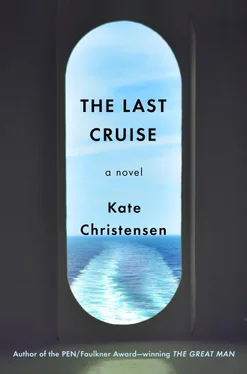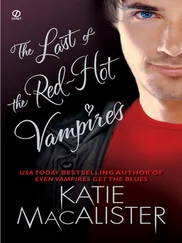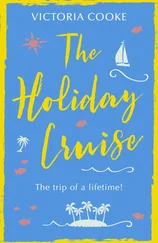“Wow.” Christine heard real surprise in Valerie’s voice. “I didn’t know that.”
“Okay,” said Consuelo. “I have to go now.”
There was a click. Christine took off the earbuds.
“That’s horrifying.”
“I know, right?” said Valerie. She finished her martini. “Want to go in the pool and lie on one of those big rafts?”
“In our clothes?”
“Why not? I’ll leave my phone here. No one will steal it.”
They arranged themselves head-to-toe on an empty raft, cradling their drinks. Christine kicked gently against the pool’s edge and sent the raft bobbing and floating into the middle. The surface of the water rocked and shimmered. Light from tiki lamps shot upward and dissipated in the still air. There were a few other people, dog-paddling with foam noodles, lounging on fat inner tubes, but no one paid attention to them. It was as if they were in a self-contained little bubble, a sanctuary of sorts. Christine looked down at her bare feet glowing like pale flat fish above the blue water, bobbing around with the bright neon purple and pink floating things. It reminded her of the aquarium, which gave her a fresh jolt of that same panicky, desolate feeling she’d had looking in at all those creatures in their tanks, reading all the plaques about the dying oceans. But there was something else too, something more immediate and personal. She felt a resurgence of the long-quashed yearning that had been awakened by her conversation with Miriam that morning.
She lifted her head. Being around Valerie’s fast-talking nervous energy made Christine aware of how slow and stolid she had become. She could feel Valerie’s brain working now, even when she was silent, the energy of her thoughts running ceaselessly. Christine remembered being that way, back in her old life. Now, there were whole swaths of time when her thoughts seemed to stop, when action took over completely and she became a functioning machine, carrying out her tasks. She thought with an odd, unaccustomed longing of her old walk-up apartment in New York, on Orchard Street, the sour, fecund smell of the old tenement stairwell; she remembered climbing up the four flights to her apartment’s battered front door in stylish leather boots, heavy plastic bags of groceries wrapped around both wrists. It was odd how real it felt to her, more real than the farm, as if her entire life since going back to Maine had been some sort of hallucination, as if she’d never left that life of late nights in bars and reading books on long subway rides and jostling through crowds of varied, interesting people.
She hadn’t been looking to escape from that life, not consciously. But one fall weekend, she had gone up to Maine to visit her parents in Standish, and incidentally to interview a farmer friend of theirs named Ed Thorne for a piece she was thinking of writing on the rising popularity of small organic farms in New England. She had driven her mother’s old Subaru over to Fryeburg on a clear, crisp day to find Ed heaping a pile of pumpkins into the back of his truck to take to the farmers market the next morning. As Ed liked to put it, it was love at first question; she sat on his porch all afternoon with him, drinking mead he’d made with honey from his own bees, and then sat all evening at his table, eating the dinner he cooked, food he’d raised and grown himself, and then she spent the night with him, and the next night, too. It was a relief to admit it to herself: she was tired of being broke, in debt, stressed-out about money and bills, the hustle of freelancing. Six months later, she left New York and moved back up to Maine to live with Ed. The piece never got written. That had been almost eight years ago.
“Val,” she said now, “I have to make a decision. Ed wants kids, and I don’t.”
Valerie sat up, rocking the raft, splashing them both. “You never told me that. What do you mean, you don’t want them?”
“I’m not sure.”
“But don’t you need them to collect eggs and harvest stuff and put wood on the fire?” Valerie laughed. “All I know is Little House on the Prairie. ”
“I don’t want to turn into a mother,” said Christine. “My mother.”
“Listen, I get it, I don’t want kids either,” said Valerie. “At all. But if I were married and lived on a farm, I’d totally have them.”
“Sometimes I miss my old life.”
“You never loved New York, and you didn’t love journalism either. You were good at it, but you always said you hated the bias and slant and trashiness of it all.”
“Maybe so,” Christine said. She went silent, let the whole subject go, feeling disappointed and slightly depressed. She had expected Valerie to say something different; had wanted her to, even.
Someone jumped into the pool near them. Water sloshed into Christine’s ear and gin went up her nose. She coughed. The raft bobbed on the wake. Overhead, the Milky Way sprawled across the length of the sky, a violently lavish expanse of light, exactly as it did on clear nights in the sky above the farm, but it looked more dazzling and savage here. Christine felt a burst of wild, open excitement. Here she was, drunk on a raft in a pool on a ship on a dark ocean, thousands of miles from home. Anything was possible.
part two
THE FLOATING WORLD
Something had been happening to Miriam on this cruise. Maybe the Pacific Ocean had something magical in its ions, maybe its wind strummed her cells, Aeolian harp–like, and produced harmonies and frequencies she could feel but not hear. But she had been feeling a little giddy since the ship had left port.
It was Sasha.
While they performed the Rosamunde Quartet on their second night at sea, she had felt a leaping of their souls toward each other in midair, wafted by the music.
It was crazy to articulate it thus to herself. It was insane. She was the most sensible of musicians, the most determined to attribute the sweet power of a tremolo, the foreboding of a shift to a darker key, a melody’s progression from blitheness to awe, to the mathematical relationships between notes and the fact that the human ear and psyche were attuned viscerally to these things the way a dog’s ears picked up high-pitched noises and caused a tumult of barking. These music-fed emotions weren’t real, they were no more than notes, bowings, changes; sure, they conjured real feelings. But they didn’t themselves cause them.
Still, she could not account for the exalted joy she felt from the opening notes of the first movement. She felt as if the music itself were lifting her soul from her rib cage and transporting it somewhere overhead, where it met Sasha’s soul in a dance. That was the part she couldn’t explain; she didn’t believe in souls, let alone that they could just fly, willy-nilly, from the breasts of elderly violinists, and encounter each other somewhere above their heads.
And yet, it had happened. It felt as real to her as her feet felt on the floor. She turned to her right as she played and looked at Sasha, and he turned to his left and looked over his fingerboard at her, and they both raised their eyebrows at the same time as if to say, Yes! This is an odd thing that our souls are dancing together overhead! But they are!
So she wasn’t imagining it.
They had played this quartet more times than she could remember. It was one of Schubert’s greatest quartets, the full expression of his genius; it was imbued with the composer’s humane and profoundly emotional melodic voice. The conversation between the four instruments was a lamentation and a rejoicing at the same time, sorrowful but light. “Schöne Welt, wo bist du?” the first movement asked. “Beautiful world, where are you?” Her second-violin part moved restlessly around the median, as if questioning, and Isaac’s viola and Jakov’s cello undergirded her. Sasha’s melodic first-violin part was sure and true, as if he were leading them all together into a leap of faith that if they played this piece through to the end, they would find it, the beautiful world. He soared up toward it.
Читать дальше












